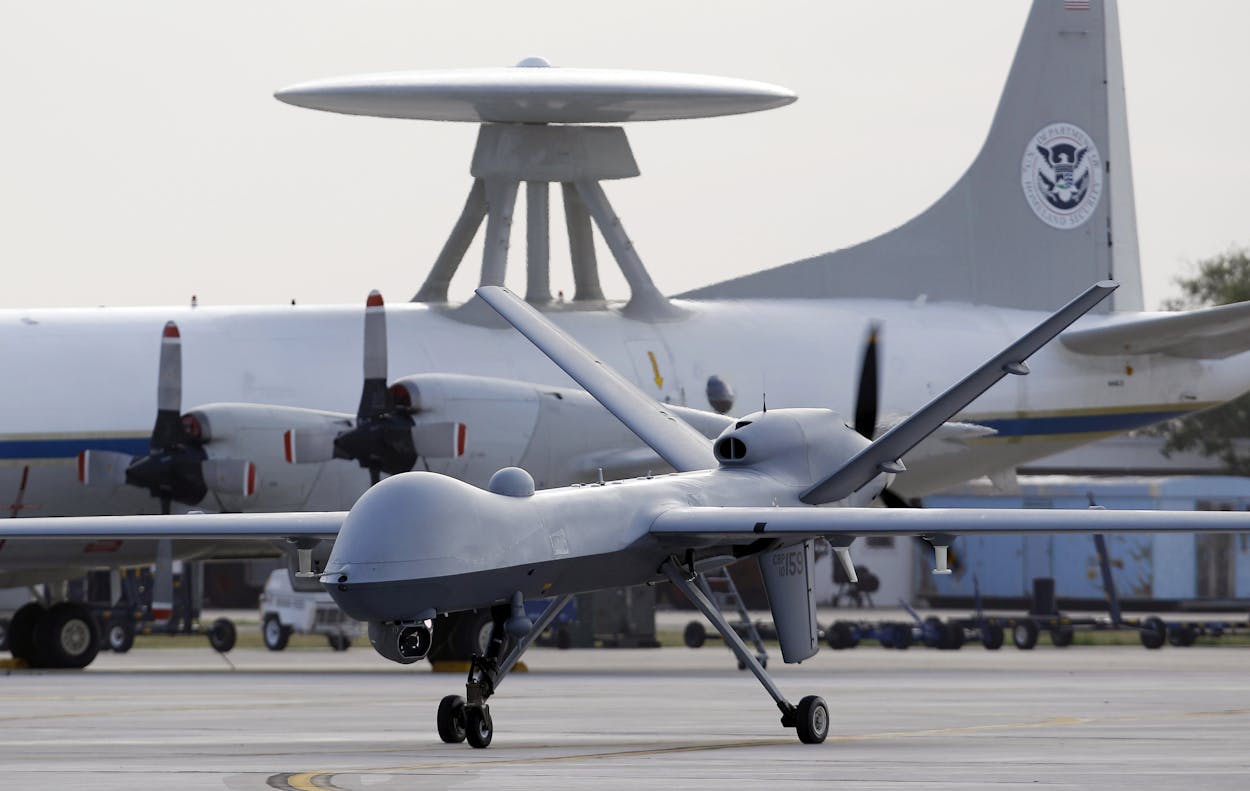Game of Drones
Texas is likely to become a top state for unmanned drone aircraft production in the next two decades, according to a new analysis by Fortune. The state ranks third on the magazine’s list of “9 States Poised to Dominate the Drone Economy,” thanks in part to a robust aerospace sector led by companies including Lockheed Martin, Bell Helicopter, General Dynamics, and Boeing, which all have operations here.
Fortune also credited Texas’ engineering education programs and scientific workforce bolstered by the Johnson Space Center in Houston and drone research efforts at Texas A&M. The article also points out that Texas is “thus far keeping a very open mind” about the use of drones from a policy perspective, with several city police departments already using unmanned helicopters in their operations.
The Bottom Line: A report published earlier this year by the Association for Unmanned Vehicle Systems International estimates the drone industry will help create about 4,000 jobs in Texas and generate more than $700 million in the state economy in the next decade.
Facebook Phone Keeps Limited Profile
AT&T may be getting ready to drop the HTC First, a.k.a. the “Facebook phone,” from its friends list. The Dallas-based corporation was the first U.S. carrier to start selling the smartphone in April, but reports of sluggish sales are prompting speculation that the company could discontinue it, according to Businessweek. The phone comes with the new Facebook Home platform pre-installed, allowing users to see friends’ updates on their home screens without having to open an app.
The tech blog BGR broke the news of the potential discontinuation on Monday, citing an anonymous “trusted source” at the company. AT&T says it hasn’t made any firm decisions yet.
The Bottom Line: BGR reports that AT&T had only sold 15,000 units through last week, and while no official sales figures have been made public, there are other indications of a tepid response from customers: In the phone’s first month on the market, AT&T has already cut its retail price by $100 — from $99.99 to just 99 cents.
Gold In-State Warrior
A Texas lawmaker is fighting to bring back home about $1 billion in state-owned gold bars that are currently deposited in a New York vault. State representative Giovanni Capriglione, R-Southlake, is pushing a bill that would establish a new bullion depository to house the gold, which belongs to the University of Texas Investment Management Co., the Fort Worth Star-Telegram reported this week.
Capriglione says the measure would help “protect the contents of the depository from the federal government and other countries” and would also “create an economic development opportunity” by allowing the state to store gold owned by financial institutions, cities, school districts and other organizations for a fee.
The Bottom Line: There is some dispute about how much it would cost to run the depository. The Legislative Budget Board puts the price tag for technology, maintenance and other costs at $4 million to $5 million each year, but Capriglione says it can be done for about $250,000 annually—while also generating anywhere from $20 million to $100 million a year for the state.
Winners of the Week: Cab Companies
Taxi owners scored a legislative victory this week when the state Senate voted to allow them to display alcohol advertisements on their vehicles, which had previously been outlawed by Texas’ Alcoholic Beverage Code, the Austin Business Journal reports. The bill—presumably also welcome news to alcohol advertisers eager to get in front of the key late-night bar patron demographic—is now on its way to the governor’s office for approval.
Loser of the Week: Lockheed Martin
Production of the Fort Worth-made F-35 Joint Strike Fighter could be held up due to federal employee furloughs scheduled to begin this summer, Reuters reported this week. As a result of sequestration spending cuts, the Pentagon plans to put more than 600,000 civilian employees—including those who participate in flight-testing for the new Lockheed Martin jet on unpaid leave for 11 days between July and September. Civilian workers are also involved in operating control towers, refueling aircraft and paying defense contracts, all of which could be affected by the cuts.






